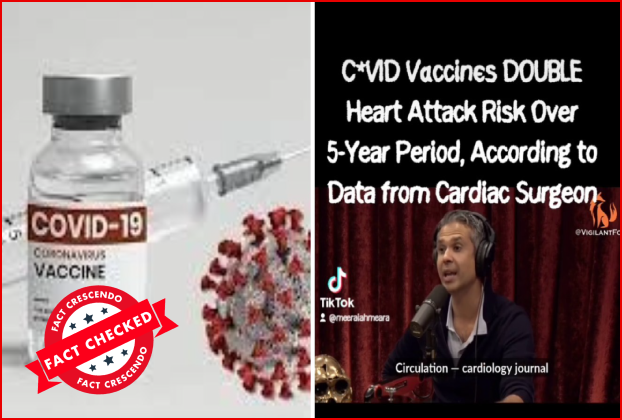In a recent episode of “The Joe Rogan Experience,” A British cardiologist, Aseem Malhotra, asserted that the COVID-19 vaccine may raise the chance of significant side effects, such as heart attacks. Malhotra claims that compared to hospitalization with COVID-19 alone, people were more likely to suffer major adverse effects from COVID-19 immunization, as seen in the studies leading to vaccine licensure.
Social Media Post
A video has been shared by many and circulating claims made by British cardiologist Aseem Malhotra, who suggests an increased risk of serious adverse events, including heart attacks, associated with Covid-19 vaccination. The posts present excerpts from Malhotra’s interview on “The Joe Rogan Experience,” where he questions the safety of mRNA vaccines.
We decided to do a fact-check on this.
Fact Check
Background information of the speaker
Aseem Malhotra, a British cardiologist, public health campaigner, and author, has gained notoriety for his controversial views on diet, health, and COVID vaccines. During the COVID-19 pandemic, Malhotra published “The 21-Day Immunity Plan,” asserting that following the diet could reduce the risk of the virus. He is a well-known influencer worldwide because of his views on diet, health, and m-RNA vaccines. However, most organizations reject these claims as lacking support from medical research evidence. Initially supporting the COVID vaccine, he later campaigned against the use of COVID mRNA vaccines, contrary to available evidence.
We decided to do a fact-check on the following.
Malhotra cites a September 2022 study published in the journal about vaccination and claims that vaccination recipients have a “16 percent higher risk of serious adverse events”. Additionally, he cites an abstract from Circulation that suggests a significant rise in the risk of heart attacks following immunization.
Claim 1 – Vaccination recipients have a “16 percent higher risk of serious adverse events”.
In the research cited by Dr. Malhotra, data was collected from the clinical studies for the Covid-19 vaccines from Pfizer and Moderna and were examined by researchers from the United States, Spain, and Australia.
They have selected a “priority list of Covid-19 adverse events of special interest” from the Brighton Collaboration, a global research network devoted to vaccine safety. The conditions on this list ranged from acute respiratory distress syndrome to loss of smell. Here, some criticize the study for not concentrating on every possible adverse effect. Supporting that, the vaccine report’s authors have also stated that their research “does not consider data on post-authorization vaccination program impact” and that it “was not designed to evaluate the overall harm-benefit of vaccination programs to date.”
In addition, according to the US Centers for Disease Control and Prevention (CDC), verified reports of adverse effects are uncommon. Following COVID-19 immunization, anaphylaxis is not common. About five instances have happened for every million doses of the vaccine that have been given. Any immunization might result in anaphylaxis, a severe allergic response. If it occurs, medical professionals can treat the response efficiently and quickly.
Claim 2 – Significant rise in the risk of heart attacks due to mRNA Covid Vaccines.
In November 2021, Malhotra appeared on GB News, discussing an academic poster by Steven Gundry warning of potential errors. He claimed the abstract supported a significantly increased risk of heart attack from mRNA vaccines against COVID-19.
In September 2022, Malhotra publicly campaigned against COVID-19 mRNA vaccines. However, some parties criticized his evidence and relied on flawed studies, while public health authorities emphasized the benefits of vaccination outweigh the risks.
Expert Reactions
Medical professionals have expressed issues over the methodology and quality of the research referenced. The Circulation abstract has also drawn criticism for mistakes, the use of anecdotal evidence, and its lack of statistical significance.
Moreover, the American Heart Association and the CDC highlighted that no proof exists to support the idea that receiving the Covid-19 vaccination raises one’s chance of having a heart attack. They emphasize how uncommon adverse outcomes are, as few confirmed reports exist.
Follow us and stay up to date with our latest fact checks.
Facebook | Twitter |Instagram | Google News | TikTok
Conclusion
Malhotra’s statements contradict professional opinions, such as those from the CDC and the American Heart Association, and are not supported by the larger body of evidence. Malhotra’s research has drawn criticism for its flawed methodology and inability to be applied to a larger population. However, developing research methodology for a substantial population is difficult. Therefore, a risk-benefit analysis is necessary for Covid-19 vaccinations, as it is for any medical procedure, and the available data firmly indicates that the shots are safe and effective in avoiding serious disease and hospital stays.

Title:Is it true that the statement of the COVID-19 vaccine and Severe Adverse Risk for Heart attracts?
Written By: Fact Crescendo TeamResult: Misleading






